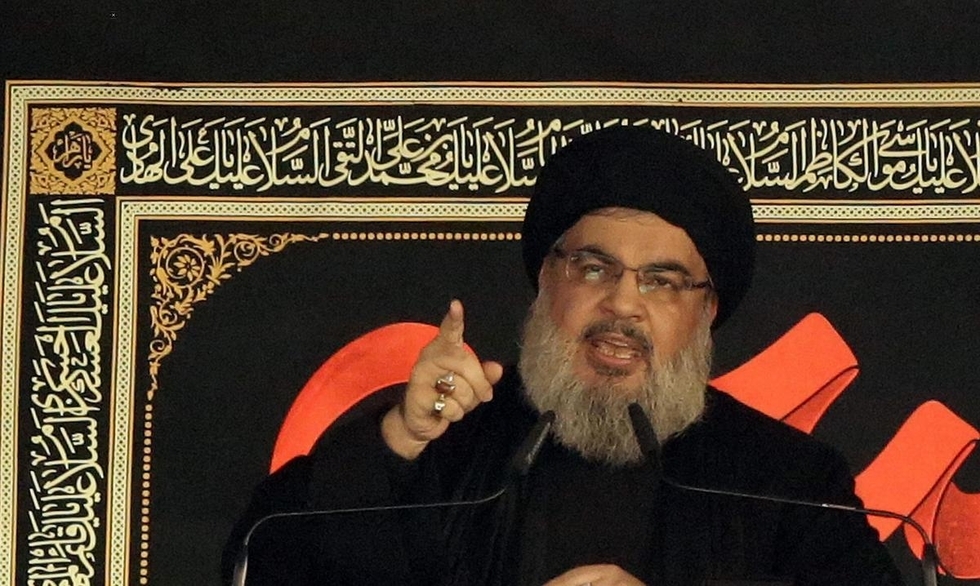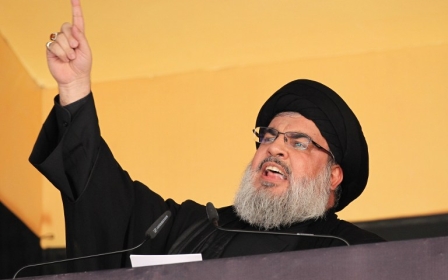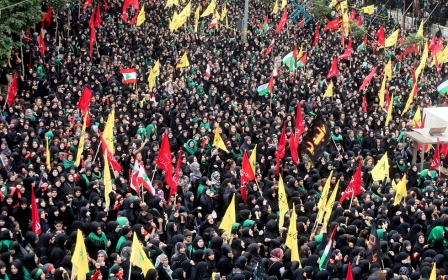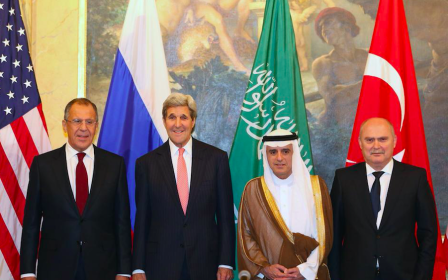Hassan Nasrallah and the war on Saudi Arabia

Back in 2004, shortly after the invasion of Iraq, King Abdullah of Jordan famously spoke of the emergence of the so-called Shia crescent across the region. This alert was dismissed by many as a mere scarecrow to be used by the United States and its allies to justify and legitimise their presence in Iraq and possibly beyond.
A decade later, this crescent has become a reality as Iran and its subsidiaries have consolidated their interests across the region, especially after it was able to break out from an international political and economic embargo, with Obama driving through the nuclear deal.
Furthermore, with Hezbollah operating both in Lebanon and Syria, and Iran’s Iraq allies in virtual control of the country as well as the Houthi insurgency in Yemen, Iran appears to stand virtually uncontested - but does it?
Hezbollah leader Hassan Nasrallah’s recent attack on Saudi Arabia, however, might be construed as suggesting that this ironclad grip is feebler than it seems.
Speaking at the end of Ashura, commemorating the 7th-century slaying of al-Imam al-Hussain, the third Shia Imam, by the Umayyad caliph Yazid I, Nasrallah unleashed a barrage of insults against the role of Saudi Arabia in the region, its unjust war in Yemen, and its patronage of Islamic terrorism.
Nasrallah, a day earlier, breaking with the traditional esoteric messages which govern domestic and regional political exchanges went as far as to call the Saudis “good-for-nothing lazy bellies” who are doing the bidding of the United States in the region. Nasrallah’s words were met with a jubilant crowd who raised their fists in anger as they chanted “Death to the house of Saud!,” replacing the ever popular "Death to America!".
Naturally, these slurs were met with outraged reactions by the Lebanese allies of Saudi Arabia, who accused Nasrallah of further polarising an already volatile political setup. Saad Hariri, the former prime minister and head of the Future Movement, accused Nasrallah of using a sacred religious occasion to augment the Sunni-Shia schism and, more importantly, to damage historical Lebanese-Saudi relations.
Such exchanges of verbal blows are not unprecedented nor are they unexpected at a time when Iran and Hezbollah are trying to replace Saudi Arabia and other Sunni powers as the new regional superpower.
In Syria, Iran has been invigorated by Russia’s direct involvement in the fighting - something which will ease the pressure and the depletion of men and resources which Hezbollah have been incurring since the onset of this conflict three years ago. In Lebanon, Hezbollah continues to derail the democratic process by refusing to elect a president unless their main Christian ally, Michael Aoun is appointed.
'Jurassic entity'
Given all of the above, and the ever-growing confidence of Iran and their allies following the nuclear deal, one is left wondering why Iran, through Hezbollah and its clients, is so furiously attacking what it has been branding as a Jurassic entity on the road to destruction?
Nasrallah has ardently claimed that his troops are winning the war against the terrorism of Saudi Arabia and the US in Syria and the region. He seemed especially perturbed by what he branded as a weak and feeble opponent. Furthermore, why would he stress dialogue if he has all the winning cards and was on the right track to liberate Syria and restore Bashar al-Assad’s control?
Iran’s supposed transition from the role of the rabble-rouser to a regional superpower requires some changes in attitude as well as perspective, or at least this was the intention of the Obama administration when they facilitated the nuclear deal.
It was permissible for Iran and Hezbollah, not so long ago, to rock the boat in the region and try to disrupt the political projects of the Saudi coalition. But, post-nuclear deal, Iran has transitioned from the role of the rowdy student to the role of class prefect. However, to be inducted into the hall of fame in the politics of the Levant and the broader Middle East, one should have the ability to negotiate and broker viable settlements on different levels.
Saudi Arabia and Qatar have acquired reputations as powers of moderation and settlement by convincing the warring parties in Lebanon to hammer out their differences. The Taef agreement brokered by Saudi Arabia in 1989 was the culmination of efforts to end the Lebanese civil war that had been raging since 1975. Qatar, on the other hand, played a similar role in May 2008 with the incubation of the Doha Agreement which brought an end to the brief episode of violence between the Lebanese government and Hezbollah.
In Lebanon, Hezbollah’s decision to oppose Prime Minister Tamam Salam’s government has rendered the only operational constitutional entity comatose. While it is not the only reason, this has led to a virtual collapse of the daily public services that all Lebanese require, with waste management being the top priority, but also the election of a president and the resumption of normal democratic processes.
If Hezbollah truly wants to defeat terrorism in the form of ISIS and its variants in Lebanon as well as Syria, a grassroots coalition between the different Lebanese factions is needed and this naturally requires Sunni acquiescence.
Earlier on in the Syrian conflict, when extremist Sunni elements such as ISIS targeted Shia/Hezbollah areas across Lebanon through a series of suicide bombings, it was the initiative of Saudi Arabia and its allies in the Lebanese government which helped create the needed environment to fight this threat. Naturally, wishing death to the house of Saud is certainly not the proper way to ensure that this Sunni cooperation persists.
More importantly, Hezbollah’s opponents, primarily the pro-Saudi March 14 coalition, have learned from earlier clashes with Hezbollah, especially from the May 2008 episode that challenging them physically would only lead to defeat. Consequently, March 14 have adopted a policy of negative resistance, moving the battleground into the cabinet and the parliament where Hezbollah and its ally Aoun can only derail rather than impose their will.
In the past, the waiting game proved to be extremely beneficial to both Hezbollah and Iran. However, for these factions to reserve their seat at the “big boy's table” of international politics and hammer out a Pax Iranica across the Levant, a much more mature approach is required, something which neither Iran nor Nasrallah seems to keep in their arsenal.
Brute force and military measures are neither appreciated nor sufficient to instigate stability across the Middle East. As it stands the real sign of regional and international greatness resides in Iran’s ability not to wage wars but to wage peace, something which remains to be seen.
- Makram Rabah is a PhD candidate at Georgetown University’s history department. He is the author of “A Campus at War: Student Politics at the American University of Beirut, 1967–1975” and a regular columnist for Now Lebanon.
The views expressed in this article belong to the author and do not necessarily reflect the editorial policy of Middle East Eye.
Photo: Hezbollah's Hassan Nasrallah gives a speech during Ashura ceremonies in Beirut on 24 October, 2015 (Anadolu Agency)
Middle East Eye propose une couverture et une analyse indépendantes et incomparables du Moyen-Orient, de l’Afrique du Nord et d’autres régions du monde. Pour en savoir plus sur la reprise de ce contenu et les frais qui s’appliquent, veuillez remplir ce formulaire [en anglais]. Pour en savoir plus sur MEE, cliquez ici [en anglais].





